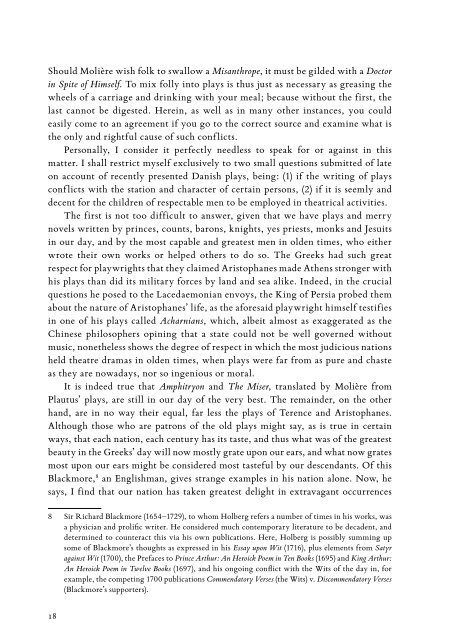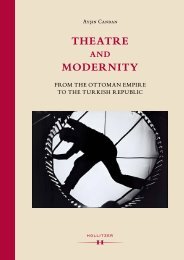Leseprobe_Holm_Holberg Plays Volume I
You also want an ePaper? Increase the reach of your titles
YUMPU automatically turns print PDFs into web optimized ePapers that Google loves.
Should Molière wish folk to swallow a Misanthrope, it must be gilded with a Doctor<br />
in Spite of Himself. To mix folly into plays is thus just as necessary as greasing the<br />
wheels of a carriage and drinking with your meal; because without the first, the<br />
last cannot be digested. Herein, as well as in many other instances, you could<br />
easily come to an agreement if you go to the correct source and examine what is<br />
the only and rightful cause of such conflicts.<br />
Personally, I consider it perfectly needless to speak for or against in this<br />
matter. I shall restrict myself exclusively to two small questions submitted of late<br />
on account of recently presented Danish plays, being: (1) if the writing of plays<br />
conflicts with the station and character of certain persons, (2) if it is seemly and<br />
decent for the children of respectable men to be employed in theatrical activities.<br />
The first is not too difficult to answer, given that we have plays and merry<br />
novels written by princes, counts, barons, knights, yes priests, monks and Jesuits<br />
in our day, and by the most capable and greatest men in olden times, who either<br />
wrote their own works or helped others to do so. The Greeks had such great<br />
respect for playwrights that they claimed Aristophanes made Athens stronger with<br />
his plays than did its military forces by land and sea alike. Indeed, in the crucial<br />
questions he posed to the Lacedaemonian envoys, the King of Persia probed them<br />
about the nature of Aristophanes’ life, as the aforesaid playwright himself testifies<br />
in one of his plays called Acharnians, which, albeit almost as exaggerated as the<br />
Chinese philosophers opining that a state could not be well governed without<br />
music, nonetheless shows the degree of respect in which the most judicious nations<br />
held theatre dramas in olden times, when plays were far from as pure and chaste<br />
as they are nowadays, nor so ingenious or moral.<br />
It is indeed true that Amphitryon and The Miser, translated by Molière from<br />
Plautus’ plays, are still in our day of the very best. The remainder, on the other<br />
hand, are in no way their equal, far less the plays of Terence and Aristophanes.<br />
Although those who are patrons of the old plays might say, as is true in certain<br />
ways, that each nation, each century has its taste, and thus what was of the greatest<br />
beauty in the Greeks’ day will now mostly grate upon our ears, and what now grates<br />
most upon our ears might be considered most tasteful by our descendants. Of this<br />
Blackmore, 8 an Englishman, gives strange examples in his nation alone. Now, he<br />
says, I find that our nation has taken greatest delight in extravagant occurrences<br />
8 Sir Richard Blackmore (1654–1729), to whom <strong>Holberg</strong> refers a number of times in his works, was<br />
a physician and prolific writer. He considered much contemporary literature to be decadent, and<br />
determined to counteract this via his own publications. Here, <strong>Holberg</strong> is possibly summing up<br />
some of Blackmore’s thoughts as expressed in his Essay upon Wit (1716), plus elements from Satyr<br />
against Wit (1700), the Prefaces to Prince Arthur: An Heroick Poem in Ten Books (1695) and King Arthur:<br />
An Heroick Poem in Twelve Books (1697), and his ongoing conflict with the Wits of the day in, for<br />
example, the competing 1700 publications Commendatory Verses (the Wits) v. Discommendatory Verses<br />
(Blackmore’s supporters).<br />
18














